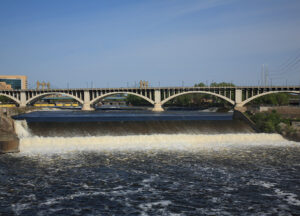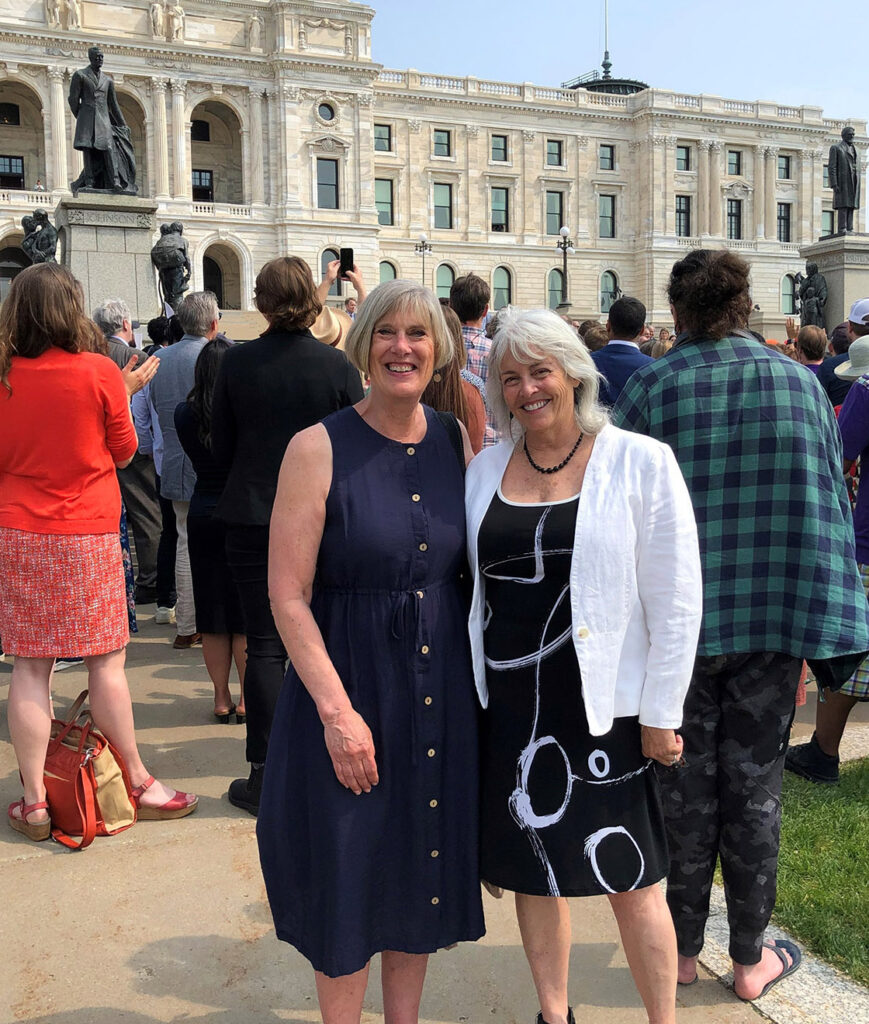Minnesota’s historic 2023 session and what’s next for water
When the Minnesota Legislature adjourned on May 22, the session was applauded by many conservation groups for providing significant investments in a broad range of environmental programs. Freshwater’s legislative priorities were successful nearly across the board with progress in the areas of soil health, water storage, drinking water protection and more.
While the post-session commentary by each party has been very different, it is important to note that there was bi-partisan work done on many environmental bills. In some cases, Republican legislators were closely involved in crafting bills, even though the overarching priorities were defined by the DFL. In the end, clean water is something all Minnesotans support, and we believe the policies enacted this session represent a major step in the right direction.
There is much work to be done, such as addressing the shortage in funding for soil and water conservation districts (SWCDs). Freshwater is already beginning to strategize on how to approach next year’s session, and we welcome your input. First, let’s take a look at the results of our 2023 policy work.
Water storage
Freshwater led the effort in 2020 to establish this Board of Water and Soil Resources program for Water Storage and Climate Resilience, which helps prevent agricultural runoff through projects like ponds, basins and restored wetlands. Dr. Carrie Jennings, Freshwater research and policy director, testified on behalf of the program this year, helping to garner funding support. Freshwater also helped introduce a $15 million bonding bill (SF478) for water storage to further accelerate this important climate resiliency tool.
Result– The Legislature approved $17 million in one-time funding for the biennium. The bonding bill for water storage did not pass, and Freshwater will re-evaluate this option for the 2024 session.
 Soil health
Soil health
A newly introduced program for the Board of Water and Soil Resources, soil health was a priority for Freshwater because of its influence on water quality and carbon sequestration in agricultural areas of the state. This aligns with Freshwater’s 5-year longitudinal study of changes to soil health that result from regenerative poultry practices.
Result– The Legislature approved statutory authorization for the program, along with $21.1 million in one-time funding for the biennium. Freshwater’s College of Biological Sciences interns have already started learning about plans to use this funding and will weigh in with their thoughts after a summer of research.
Resilient communities grants and technical assistance
This grant program at the Minnesota Pollution Control Agency provides critical resources to help communities plan and implement projects that will support adaptation to a warmer and wetter Minnesota.
Result– The Legislature approved $100 million in one-time funding for the biennium.
 Drinking water protection and PFAS response
Drinking water protection and PFAS response
These funds are essential for planning, designing and bidding public water treatment systems to combat widespread PFAS contamination in drinking water across the state.
Result– The Legislature approved $25 million in one-time funding for the biennium.
PFAS Blueprint
Freshwater supports efforts to implement Minnesota’s PFAS Blueprint, a comprehensive action plan created by the Minnesota Pollution Control. This includes adding agency staff to begin the first major initiative of the blueprint, the PFAS Monitoring Plan.
Result– The Legislature approved $4.1 million in one-time funding for the biennium. This was one of many PFAS related provisions, including a statewide ban on non-essential use, passed this session designed to strengthen state response to this difficult problem.
Clean Water Legacy Fund
This was a historic session for the Clean Water Fund, which directs one third of tax revenue generated by the Legacy Amendment to fund water projects statewide. Through her work on the Clean Water Council, long-time Freshwater staffer Jen Kader (now with the Metropolitan Council), has helped to improve the funding process, which went exceptionally well this year.
Result – For the first time ever, the Legislature did not make any changes to the Clean Water Council and Governor’s recommendations on project funding.
Soil and water conservation district (SWCD) funding
Freshwater partnered with The Nature Conservancy and Conservation Minnesota to advocate for shifting the funding source for SWCDs to the General Fund – instead of the Clean Water Fund, where it had come out of the past six years. SWCDs have been chronically underfunded, which prevents them from providing needed technical assistance to Minnesota farmers who want to install clean water/healthy soil practices.
Result – While the shift of funding to the General Fund was successful, SWCDs will actually receive $7 million less per year over the next biennium – a disappointing result. The final tax bill (HF1938), creates a new SWCD aid program funded at $30 million for this biennium ($15 million per year); and $24 million per year in FY26/27. SWCDs had been receiving $22 million per year out of the Clean Water Fund.
Environment and Natural Resources Trust Fund
The Legislature approved the package of projects proposed by the Legislative-Citizen Commission on Minnesota Resources, which was included in the omnibus natural resources, environment and climate bill (HF2310). Freshwater has been part of a coalition to reauthorize constitutional dedication of the Environment and Natural Resources Trust Fund, calling for it to be included on the ballot in 2024 so that voters may extend the fund for another 25 years.
Result – Within this year’s approved package, Freshwater has partnered on a $391,000 project to study the feasibility of managed aquifer recharge, a tool that may be needed in groundwater-stressed areas of the state. This is the third step taken since our Stretching Supplies groundwater report highlighted managed aquifer recharge as a tool that may be needed. We followed with a statewide feasibility study, Banking Groundwater, which highlighted needs to improve aquifer data. In the 2022 session, which ended with no budget, we managed to deliver $500,000 to the DNR and direct them to complete an Aquifer Properties Database, a necessary tool to calculate the potential to recharge groundwater.
In addition, the Legislature passed renewal of the Environment and Natural Resources Trust Fund (HF1900), and it will appear on the ballot in 2024.
St. Anthony Cutoff Wall
Freshwater partnered with Friends of the Mississippi River in supporting legislation to fund a technical study of the St. Anthony Falls cutoff wall on the Mississippi River in downtown Minneapolis because its current structural and geological integrity is not well understood. Freshwater’s Eileen J. Kirby and Carrie Jennings provided public testimony and technical support as part of this collaboration with the University of Minnesota’s St. Anthony Falls Lab and Hennepin County Emergency Management.
Result – The Legislature appropriated $1 million, $250,000 more than requested, to fund the study, which will be led by Jeff Marr at the University of Minnesota with Freshwater playing an advisory role.
Lead pipe replacement
This Minnesota Department of Health grant program will help municipalities find and replace lead service lines and pipes. It sets a goal of removing these lines from public water systems statewide by 2033. Estimated total cost to remove all lead service lines in the state is estimated at $800 million.
Result – The Legislature passed the bill (HF24/SF340) to provide $240 million for the biennium in one-time funding.
Wastewater infrastructure investments
State matching funds are needed to free up federal Infrastructure Investment and Jobs Act grants to address a significant backlog of wastewater projects, particularly in low-income communities.
Result – The Legislature passed two bonding bills (HF699 and HF670) that appropriate over $500 million to the Public Facilities Authority for federal matching funds, along with grants for water infrastructure and source implementation.

Thanks to our team and legislative supporters
These positive outcomes are due in large part to Freshwater’s 2023 policy team of Carrie Jennings, Jen Kader, Eileen J. Kirby, along with Judy Erickson of Conservation Strategies.
Our team met with nearly all new DFL House and Senate members who served on the environment or legacy committees, and we continued developing relationships with key GOP leaders in these areas. We’re especially grateful to the following members who worked in support of our priorities:
Senator Foung Hawj (DFL-St. Paul), Sen. Nick Frentz (DFL-Mankato), Sen. Jen McEwen (DFL-Duluth), and Sen. Kelly Morrison (DFL-Deephaven); Rep. Rick Hansen (DFL-South St.Paul), Rep. Patty Acomb, (DFL-Minnetonka), Rep. Sydney Jordan (DFL-Minneapolis), Rep. Ginny Klevorn (DFL-Plymouth), Rep. Leon Lillie, (DFL-North St. Paul), Rep. Kristi Pursell (DFL-Northfield), Rep. Liz Reyer (DFL-Eagan).
Looking forward
The next legislative session begins February 12, 2024. Work for the 2024 bonding bill is already underway with state and local governments submitting requests to the Minnesota Department of Management and Budget. The House and Senate Capitol Investment Committees will begin conducting tours of potential project sites later this summer.
Freshwater is following recent changes to groundwater permitting and enforcement, along with other critical water issues, as we begin to create next year’s legislative agenda.
We’d like to hear from you about which issues you think are most important. Was there a bill you hoped would have passed this year? Is there a water program that needs reform or funding? Is there a new policy area you think we should partner on? Email us your ideas.